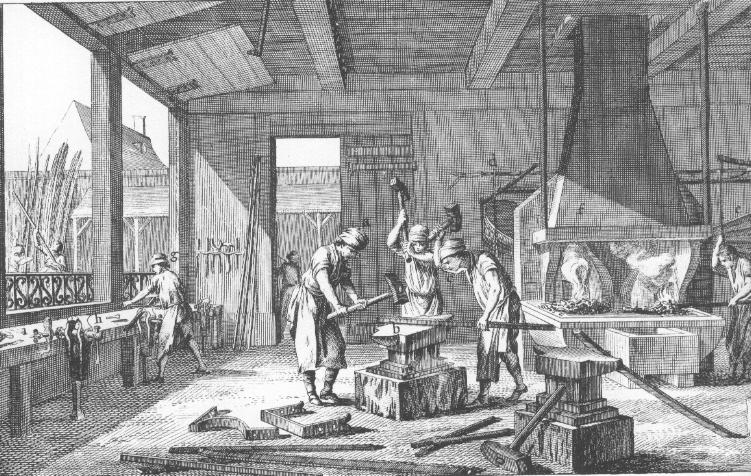Schwarz
View current page
...more recent posts
a 17 vol diderot encyc can be viewed by clicking the above illustration
André Le Breton, a bookseller and printer, applied to Diderot with a project for the publication of a translation of Ephraim Chambers' Cyclopaedia, or Universal Dictionary of Arts and Sciences into French; first undertaken by the Englishman John Mills, and followed by the German, Gottfried Sellius. Diderot accepted the proposal, during this translation his creative mind and astute vision the work became transformed. Instead of a mere reproduction of the Cyclopaedia, he persuaded Le Breton to enter upon a new work, which would collect all the active writers, ideas, and knowledge that were moving the cultivated class of the Republic of Letters to its depths; however they were comparatively ineffective by due to their lack of dispersion. His enthusiasm for the project was transmitted to the publishers; they collected a sufficient capital for a more vast enterprise than they had first planned. Jean le Rond d'Alembert was persuaded to become Diderot's colleague; the requisite permission was procured from the government. In 1750 an elaborate prospectus announced the project to a delighted public; and in 1751 the first volume was published. This work was very unorthodox and had many forward thinking ideas for the time. Diderot stated within this work, "An encyclopedia ought to make good the failure to execute such a project hitherto, and should encompass not only the fields already covered by the academies, but each and every branch of human knowledge." Upon encompassing every branch of knowledge this will give, "the power to change men's common way of thinking." This idea was profound and intriguing, as it was one of the first works during the Enlightenment. Diderot wanted to give all people the ability to further their knowledge and, in a sense, allow every person to have any knowledge they sought of the world. The work sought to bring together all knowledge of the time and condense this information for all to use. Using not only the expertise of scholars and Academies in their respective fields but that of the common man in their proficiencies in their trades. These people would amalgamate and work under a society to perform such a project. They would work alone in order to shed societal conformities, and build a multitude of information on a desired subject with varying view points, methods, or philosophies. He emphasized the vast abundance of knowledge held within each subject with intricacies and details to provide the greatest amount of knowledge to be gained from the subject. All people would benefit from these insights into different subjects as a means of betterment; bettering society as a whole and individuals alike. This message under the Ancien Régime would severely dilute their ability to control the people. Knowledge and power, two key items the upper-class held over the lower-class were in jeopardy as knowledge would be more accessible giving way to more power amongst the lower-class. An encyclopedia would give the layman an ability to reason and use knowledge to better themselves; allowing for upward mobility and increased intellectual abundance amongst the lower class. A growth of knowledge amongst this segment of society would provide power to this group and a yearning to question the government. The numerated subjects in the folios were not just for the good of the people and society, but were for the promotion of the state as well. The state did not see any benefit in the works, instead viewing them as a contempt to contrive power and authority from the state.

